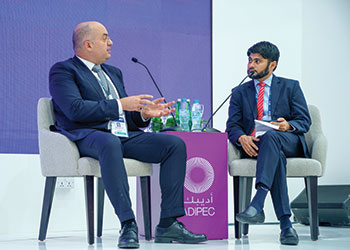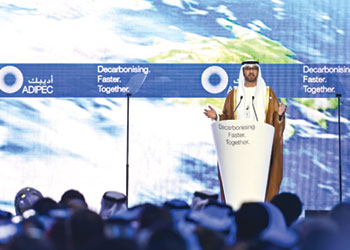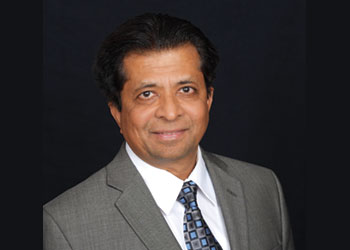
 Ghazouani (left) speaks at an Adipec panel
Ghazouani (left) speaks at an Adipec panel
The largest contributor to Scope 3 emissions for chemical companies is feedstocks, and we can either use feedstocks with lower emissions, or in the case of Phasetreat Wet, improve the efficiency of a product, Zied Ghazouani tells OGN
Clariant Oil Services is striving to introduce innovative solutions to the oil and gas industry with the aim of making the overall production process more sustainable and even considering Scope 3 emissions, and to adhere to health, safety, and environmental regulations.
One solution it boasts of is the D3 Program, which was created to help customers reduce carbon emissions and enhance safe operations, Zied Ghazouani, Head of EMEA, Clariant Oil Services, told a panel moderated by Abdulaziz Khattak of OGN energy magazine at Adipec in Abu Dhabi.
Clariant participated in the cross-industry co-lab zone to emphasise its commitment to fostering collaboration and driving positive change in the energy industry.
Below are excerpts from the interview:
How is Clariant aiming to address some key challenges in the oil and gas industry?
While hydrocarbons continue to serve as a vital, global energy source, the industry is seeking more efficient processes and feedstocks.
In collaboration with some of the world’s largest energy companies, Clariant Oil Services is monitoring regulatory changes and taking steps to ensure our solutions have the highest level of adherence to different regulatory requirements globally.
These challenges are leading to the development of more innovative solutions that are reducing carbon emissions.
A year after Clariant introduced its D3 Program, how has it helped customers and what are the results so far?
We are already seeing significant benefits of the programme, including simplified logistics for both transportation and storage, introduction of concentrated ingredients that require smaller dosage in the application, optimisation of onshore and offshore operations, introduction of more environmentally acceptable formulations, and improvements in operational safety.
The D3 Program, introduced in late 2022 to help customers reduce carbon emissions and enhance safe operations, comprises three key pillars: Decarb, which utilises nanotechnology and ingredients from renewable sources to reduce carbon emissions in customers’ operations; Densify facilitates logistics improvements and furthers sustainability initiatives through a new application with concentrated products; and Detox incorporates formulations with more environmentally acceptable raw materials.
For example, under the densify pillar, Clariant’s more sustainable demulsification process, Phasetreat™ Wet, reduces demulsifier dosages by up to 75 per cent compared to current solutions by employing nanoemulsion technology.
Clariant’s progress is made possible by close collaboration with companies taking novel formulations and processes outside of the lab and putting them through rigorous trials under various conditions in offshore and onshore oilfields.
The demand for more sustainable solutions was encouraged and supported by influential customers shaping the future of the energy industry.
We are taking learnings and advances from our customers, as well as other parts of Clariant’s business, and closely tracking carbon emissions that prove the success of our more environmentally friendly formulations.
The D3 Program evolved in Latin America. Has it now expanded globally?
As we continue to track our early successes and mature the programme through the rollout of solutions like Phasetreat WET, we are demonstrating our commitment to introducing more sustainable solutions and feedstocks in the global markets Clariant serves.
Although the D3 Program evolved in Latin America and there are region-specific demands and environmental regulations, Clariant Oil Services is building its capabilities globally where the needs overlap, underscoring the company’s commitment to global responsibility.
What is Phasetreat Wet and what aspects of traditional oil production processes does it address?
Phasetreat Wet is designed to remove organic solvents like naphtha and toluene and create a more concentrated product that is then diluted with water in the field.
For offshore operators, the solution reduces chemical volume by up to 75 per cent, resulting in reduction in freight, inventory, and offshore movements.
In onshore operations, the solution offers additional benefits, including decreased dosages for demulsifiers, improved water treatment quality, more efficient oil treatment, and reduction of injection points.
One major benefit of removing the solvents is that we reduce carbon emissions and have a direct impact on Scope 3 emissions.
The largest contributor to Scope 3 emissions for a chemical company like Clariant is feedstocks.
We can either use feedstocks with lower emissions (such as exchanging fossil-based feedstocks with bio-based feedstocks), or in the case of Phasetreat Wet, improve the efficiency of a product.
The product demonstrates Clariant’s commitment to sustainability and how we are working with our customers to understand and address their needs.
What is Clariant’s focus in the oil and gas industry in the coming years in terms of fostering sustainability?
Clariant will continue to evaluate customer product portfolios and introduce eco-friendly and rigorously tested formulations as we collaborate with energy leaders to reduce carbon emission, ensure safe operations, and achieve ESG targets.
Beyond Phasetreat Wet, Clariant is actively working on other solutions for oil and gas production that can drastically reduce chemical demand and thereby carbon emissions.
A good example of this is the replacement of thermodynamic hydrate inhibitors with low dosage hydrate inhibitors (LDHI) - the challenge being to develop an LDHI which is compatible with the strict environmental regulations in places like the North Sea.
By Abdulaziz Khattak








































































